Comparing electric vs hand coffee grinder
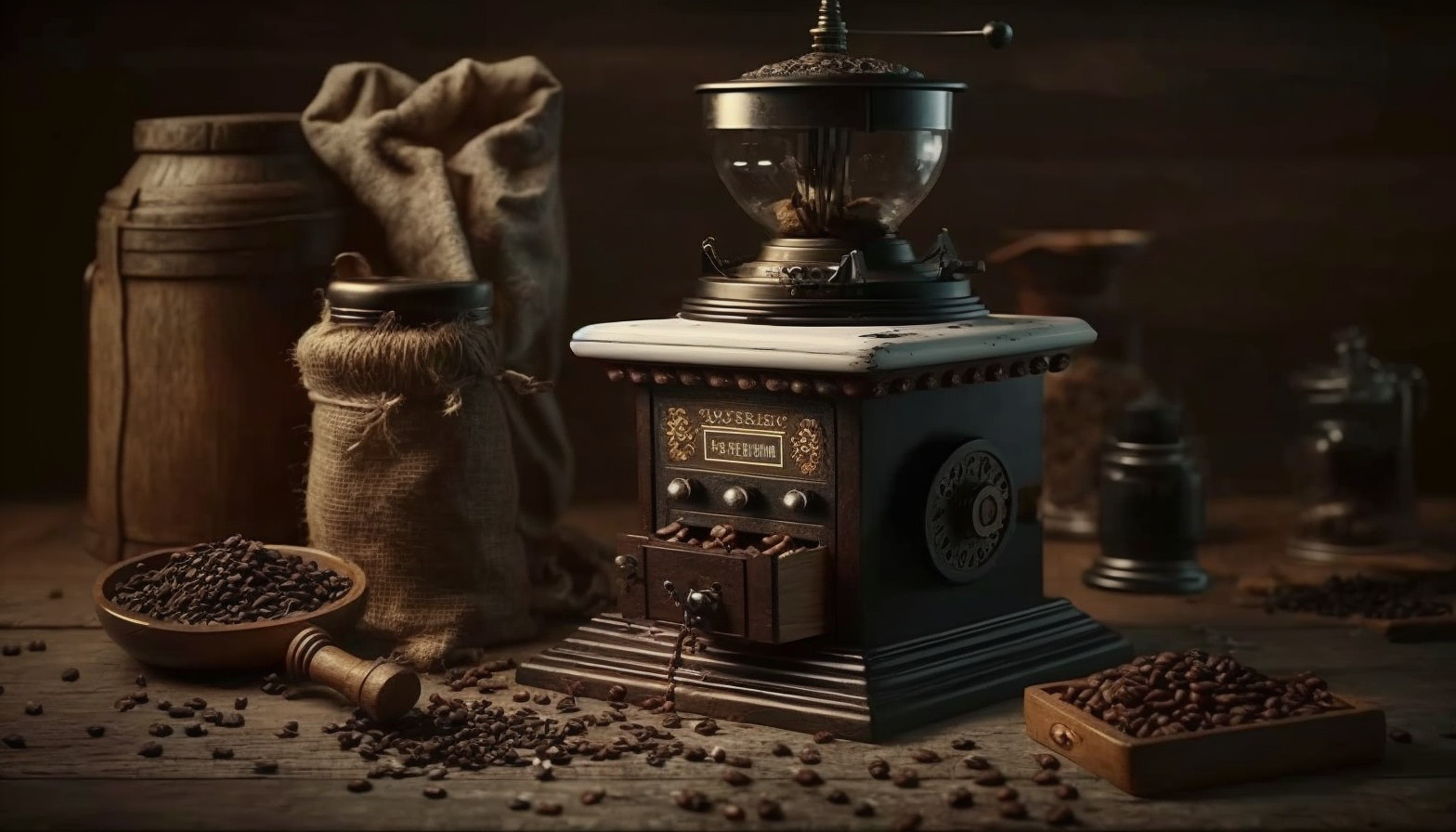
What’s the Best Way to Grind Your coffee beans?
Introduction: Overview of Hand and Electric Coffee Grinders
Coffee lovers understand the importance of freshly ground coffee beans. While many prefer the convenience of electric coffee grinders, there are still those who swear by manual hand grinders.
The debate between manual and electric grinders has been raging for years, and now it’s time to compare the two on their own merits. In this article we’ll discuss the benefits of both electric and hand coffee grinders, so you can make an informed decision when selecting your own grinder.
The Pros & Cons of Electric vs. Manual Coffee Grinders
When it comes to grinding coffee, there are two main options available: electric and manual (aka hand) grinders.
Both offer their own advantages and disadvantages, depending on the needs of each user.
Electric Coffee Grinders
Pros:
- Convenience: Electric grinders are effortless and quick to use, requiring minimal effort from the user.
- Consistency: Electric grinders offer a consistent grind size, which is crucial for brewing a balanced and flavorful cup of coffee.
- Capacity: Electric grinders can grind a larger quantity of coffee beans than manual grinders.
Cons:
- Cost: Electric grinders are more expensive than manual grinders, making them less accessible for budget-conscious consumers.
- Noise: Electric grinders can be noisy, which can be disruptive to others, especially in the morning when making a cup of coffee.
- Heat: Electric grinders generate heat during the grinding process, which can affect the flavor and aroma of the coffee.
Manual Coffee Grinders
Pros:
- Affordability: Manual grinders are less expensive than electric grinders, making them an excellent option for budget-conscious consumers.
- Portability: Manual grinders are compact and portable, making them an ideal choice for travelers, campers, and hikers.
- Control: Manual grinders allow for more control over the grind size, which can be adjusted according to personal preferences.
Cons:
- Effort: Manual grinders require more physical effort and time to grind coffee beans, which can be challenging for those with mobility issues or disabilities.
- Inconsistent grind size: Manual grinders can produce an inconsistent grind size, which can affect the flavor and aroma of the coffee.
- Capacity: Manual grinders have a limited capacity and can only grind a small amount of coffee beans at a time, making them unsuitable for brewing large batches of coffee.
Help me decide – Which grinder is better for my needs – Hand or Electric?
Deciding which type of grinder is better for your needs, hand or electric, depends on several factors such as your budget, lifestyle, and personal preferences.
If you prioritize convenience, speed, and consistency, an electric grinder might be a better choice for you. Electric grinders are effortless and quick to use, require minimal effort from the user, and can grind a larger quantity of coffee beans than manual grinders.
However, electric grinders are more expensive, can be noisy, and generate heat during the grinding process, which can affect the flavor and aroma of the coffee.
Here is the list of Best rated electric grinders in our offer:
-
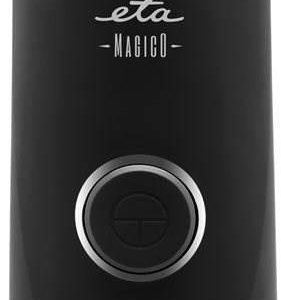 ETA Magico$11.99
ETA Magico$11.99 -
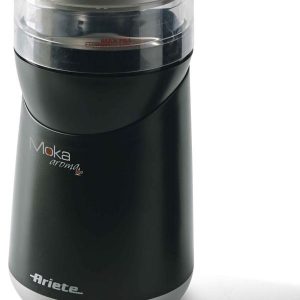 Ariete Moka Aroma$15.99
Ariete Moka Aroma$15.99 -
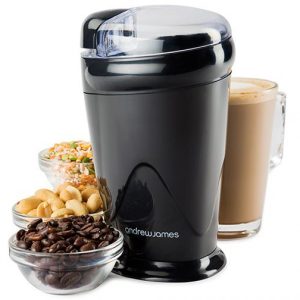 Andrew James AJ000026$12.99
Andrew James AJ000026$12.99 -
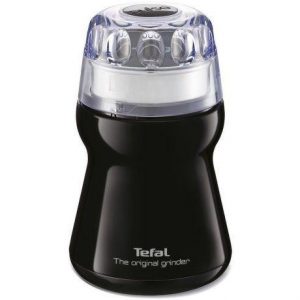 Tefal GT110838$17.99
Tefal GT110838$17.99 -
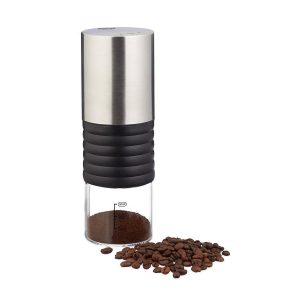 Relaxdays 10023301$20.99
Relaxdays 10023301$20.99 -
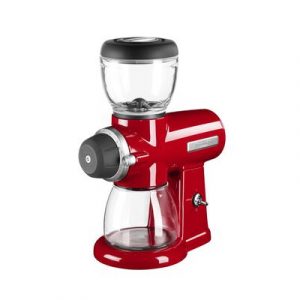 Kitchenaid 702ER$155.99
Kitchenaid 702ER$155.99 -
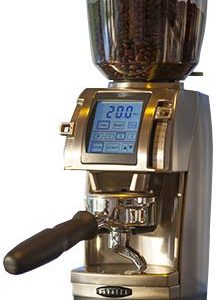 Baratza Forté AP$695.99
Baratza Forté AP$695.99 -
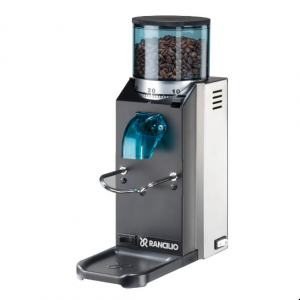 Rancilio Rocky$338.99
Rancilio Rocky$338.99
On the other hand, if you value affordability, portability, and control, a manual grinder might be a better option for you. Manual grinders are less expensive than electric grinders, compact, and portable, making them an excellent choice for travelers and campers. They also offer more control over the grind size, which can be adjusted according to personal preferences.
However, manual grinders require more physical effort and time to grind coffee beans, can produce an inconsistent grind size, and have a limited capacity.
Here is the list of Best rated hand grinders in our offer:
-
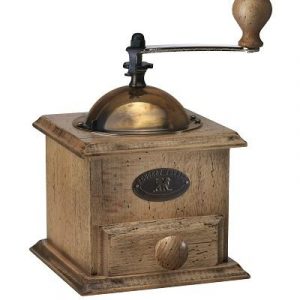 Peugeot Antique$97.99
Peugeot Antique$97.99 -
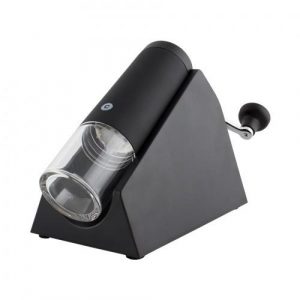 Brazil$59.99
Brazil$59.99 -
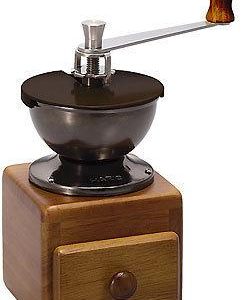 Hario Small$44.99
Hario Small$44.99 -
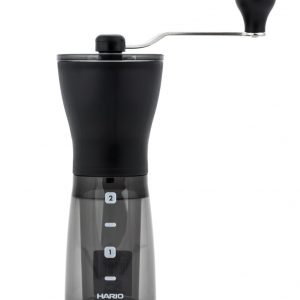 Hario Mini Slim Plus$22.99
Hario Mini Slim Plus$22.99 -
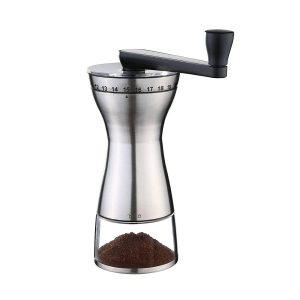 Zassenhaus Manaos$38.99
Zassenhaus Manaos$38.99 -
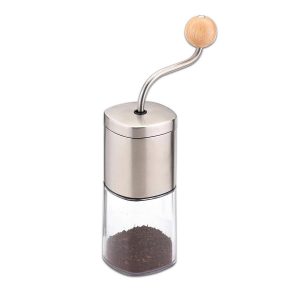 Grunwerg CG-306$11.99
Grunwerg CG-306$11.99 -
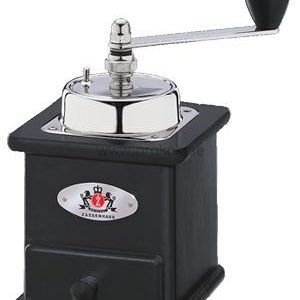 Zassenhaus Brasilia Black$56.99
Zassenhaus Brasilia Black$56.99 -
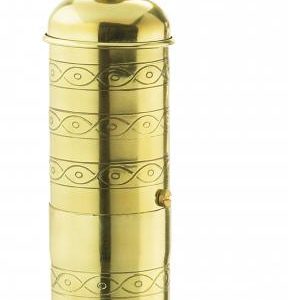 Zassenhaus Havanna$57.99
Zassenhaus Havanna$57.99
Ultimately, it’s up to you to decide which type of grinder is better for your needs. If you don’t mind putting in the extra effort and time to grind your coffee beans, a manual grinder may be a good choice. On the other hand, if you prefer convenience and speed, an electric grinder might be a better option. Consider your personal preferences and lifestyle, and choose the option that best suits your needs and budget.
Conclusion
In conclusion, the decision to choose between an electric or manual coffee grinder depends on personal preferences, lifestyle, and budget. Electric grinders offer convenience, consistency, and larger capacity, but come with a higher price tag and noise issues. On the other hand, manual grinders are affordable, portable, and offer more control over the grind size, but require more effort and time, can produce inconsistent grind sizes, and have a limited capacity. It is important to weigh the pros and cons before making a decision and choose the option that best suits your needs.
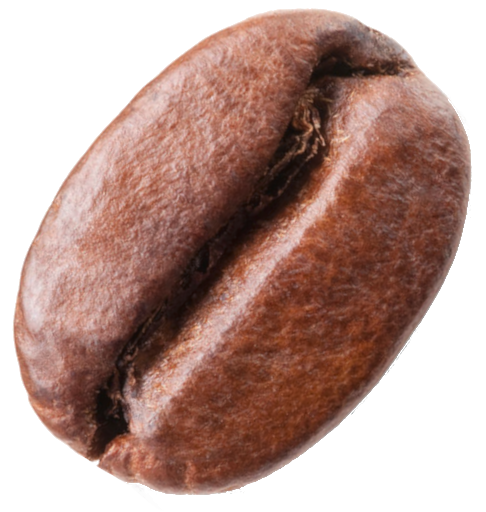
I completely agree with the author of this article. As someone who has struggled with the tedious process of manual coffee grinders, I can attest to the frustration and despair that comes with it. The constant grinding, the inconsistent results, and the limited capacity are all major drawbacks that make me wish for a more convenient and efficient option.
In today’s world, where everything is supposed to be fast-paced and convenient, I find it absurd that we still have to resort to manual coffee grinders. It’s like going back in time to an era where technology was non-existent. The electric grinder has revolutionized the way we brew our coffee, making it faster, easier, and more enjoyable.
But, as the author so eloquently puts it, “it’s not all sunshine and rainbows” with electric grinders either. They can be noisy, expensive, and sometimes produce inconsistent results. However, for me, these drawbacks are a small price to pay for the convenience and efficiency that they offer.
In conclusion, I wholeheartedly agree with the author that the decision between an electric and manual coffee grinder comes down to personal preference, lifestyle, and budget. If you value convenience and speed, then an electric grinder is the way to go. But if you’re willing to put in the extra effort and time, then a manual grinder may be worth considering.
As for my own professional experience, I’ve had the misfortune of using both types of grinders, and I can confidently say that electric grinders are far superior in every aspect. They’re faster, easier to use, and produce more consistent results. Plus, they’re generally more affordable than manual grinders, making them a no-brainer for anyone who values their time.
So, if you’re in the market for a new coffee grinder, I highly recommend considering an electric option. Trust me, your taste buds (and your sanity) will thank you!
Daniela Whitehead’s comment is filled with the same modern enthusiasm that often accompanies the introduction of new technologies. She paints manual coffee grinders as relics of a bygone era, inferior to their electric counterparts in every way.
However, I find myself nostalgic for those “tedious” days of manual grinding. There was something special about savoring each grind, each turn of the handle, and each step of the brewing process. It’s almost as if we’ve lost touch with the craftsmanship that once accompanied our daily routines.
Daniela claims that electric grinders have revolutionized the way we brew coffee, making it faster, easier, and more enjoyable. But have we sacrificed too much in exchange for this convenience? The aroma of freshly ground coffee, the tactile experience of handling a manual grinder – these are aspects of the coffee-making process that many seem to have forgotten.
Moreover, I’d argue that Daniela’s assertion that electric grinders produce “more consistent results” is subjective. What constitutes consistency in coffee grinding? Is it merely about achieving uniformity at the cost of flavor and character? I’m not convinced that this uniformity comes without a price – a price that perhaps only those who’ve experienced both worlds can truly understand.
As for her claim that electric grinders are “generally more affordable” than manual grinders, I’d like to challenge that assumption. While it’s true that electric grinders may have an upfront cost advantage, their long-term expenses often outweigh those of their manual counterparts. The batteries, the replacement parts, and the inevitable wear and tear all add up over time.
Ultimately, Daniela’s endorsement of electric grinders reflects her own priorities and values. However, for those willing to invest in a more nuanced coffee experience – one that acknowledges the complexities and joys of manual grinding – I believe there are still many benefits to be had from sticking with tradition.
Titus, you’re a breath of fresh air amidst a sea of electric fanboys (and girls). I mean, don’t get me wrong, electric grinders have their place in the world, but when people like Daniela Whitehead start spewing forth venom about manual grinders being inferior relics of the past, it’s like they’ve forgotten what makes coffee special in the first place.
I’m with you on this one, Titus. There’s something to be said for the tactile experience of grinding your own beans, the satisfaction of feeling like a artisanal craftsman as you coax out that perfect blend of flavors and textures. And let’s not forget the aroma – oh, the glorious aroma! It’s like a symphony of scents wafting through the air, teasing our taste buds and making us salivate in anticipation.
But I think Daniela (and her ilk) miss the point when they say that electric grinders produce more consistent results. Consistent? Ha! What about character? What about complexity? What about the nuances of flavor that come from grinding your beans just so, with a little bit of love and care thrown in for good measure?
And don’t even get me started on the “convenience” argument. Convenient? Please. Grinding coffee is supposed to be a ritual, not a chore. It’s about taking time to appreciate the simple things in life – the feel of the beans beneath your fingers, the sound of the grinder humming along as it brings out the best in those precious little coffee particles.
As for affordability, I think Titus has got that one spot on too. Sure, electric grinders might be cheaper upfront, but what about all those replacement parts and batteries? It’s like they say – you get what you pay for. And when you’re talking about something as essential to your daily routine as coffee, you shouldn’t be cutting corners.
Now, I know some people are going to say that manual grinders are just for hipsters and coffee snobs, but let me tell you – there’s a reason why these things have been around for centuries. It’s because they’re good. They’re really, really good. And if more people would take the time to appreciate them, I think we’d all be better off.
So, Titus, thanks for keeping it real and defending the honor of manual grinders everywhere. You go, dude!
Max Gay, my friend, you’ve touched a nerve with your passionate defense of manual coffee grinders. As I sit here sipping on a freshly brewed cup, I’m transported back to a bygone era when life was simpler, and the art of grinding one’s own coffee beans was an essential part of the ritual.
You’re right; electric grinders have their place, but they can never replace the tactile experience of manual grinding. The feel of the beans beneath your fingers, the satisfying crunch as you turn the handle, and the aroma that wafts up to tease your senses – it’s a sensory delight that’s hard to replicate with an electric device.
But let’s not forget the nuances you mentioned, Max. The character, complexity, and subtleties of flavor that come from grinding one’s beans just so are indeed essential to the coffee connoisseur’s experience. I recall a conversation I had with my grandfather, who was a skilled manual grinder himself, about the importance of “tuning” the grind to bring out the optimal flavors in each bean.
He would say that it’s not just about the physical act of grinding but also about the mental preparation, the anticipation, and the joy of creating something from scratch. It’s an experience that requires patience, dedication, and a willingness to invest time and effort into the process.
You’re spot on when you mention that manual grinders are often misunderstood as being inferior or relics of the past. But I’d argue that they’re not just about nostalgia; they’re about preserving a tradition that’s essential to our collective human experience – the art of creating something beautiful with one’s own hands.
As I ponder your words, my mind wanders to the current state of affairs in our world. The recent breakthroughs in disinfectant technology, for instance, got me thinking about the importance of balance and harmony in all aspects of life, including the way we live and interact with each other.
It’s a reminder that even in an age where technology is advancing at breakneck speed, there’s still room for human touch, for nuance, and for the simple pleasures in life. The tactile experience of manual grinding, the satisfaction of creating something from scratch – these are things that bring us closer to ourselves, to others, and to the world around us.
Max, your defense of manual grinders has ignited a fire within me, reminding me of the importance of preserving traditions, embracing imperfections, and cherishing the simple joys in life. You’re not just defending manual grinders; you’re advocating for a way of living that’s more authentic, more meaningful, and more human.
I couldn’t agree more, my friend. Keep spreading the gospel, and let’s hope that one day, people will come to appreciate the beauty of manual grinding in all its glory!
I completely agree with Titus that Daniela’s assertion about electric grinders producing “more consistent results” is subjective, and I’d like to add that consistency in coffee grinding shouldn’t come at the cost of flavor and character. The tactile experience of handling a manual grinder may be tedious for some, but it allows us to connect with the craftsmanship behind our daily routines, which is something we’ve lost touch with in today’s fast-paced world.
I’ve been following this thread with great interest, and I must say that while many of you have made some excellent points, I strongly disagree with the notion that manual grinders offer some kind of mystical connection to the physical act of grinding coffee beans (Preston, I’m looking at you). As Max so eloquently put it, grinding coffee should be a ritual, not a chore. However, I believe that this perspective is misguided.
While I agree with Andrea that manual grinders allow us to connect with the coffee-making process more deeply, I think this connection comes at the cost of practicality and convenience. I mean, let’s be real, folks, most of us don’t have the luxury of spending hours each day grinding our own coffee beans by hand. As Antonio so aptly pointed out, noisy manual grinders can keep you awake at night.
And yet, despite these drawbacks, I still believe that electric grinders have their place in the world. They’re convenient, fast, and consistent – but also expensive, noisy, and require replacement parts (Antonio, I’m not convinced that they’re more affordable). So where do we draw the line?
To me, it’s about finding a balance between convenience and craftsmanship. As Jake so passionately argued, manual grinders offer a unique tactile experience that electric grinders can’t match. But what about those of us who value our time but still want to experience the nuance and subtlety of flavor that comes from grinding beans by hand? Can we not find a middle ground between the two?
I’d love to see more discussion on this topic, particularly with regards to the long-term costs and benefits of electric vs manual grinders. And I must say, Preston, I’m shocked but not surprised that you dismissed Keegan’s comment as “empty and self-satisfied nonsense.” Perhaps we can explore what exactly Keegan meant by his comment about manual grinders offering a mystical connection to the physical act of grinding coffee beans?
To all my fellow commenters, thank you for your passionate arguments. I look forward to continuing this discussion.
Daniela’s comments are spot on! As someone who has used both types of grinders, I have to agree that electric grinders are the way to go for convenience and speed. But, as Daniela mentions, it’s not all sunshine and rainbows with electric grinders either.
I was fascinated by an article I read today about Vincent Van Gogh’s ‘The Starry Night’, which discovered a scientific theory behind its turbulent skies. It made me think of how our lives are like Van Gogh’s brushstrokes – unpredictable and full of twists and turns. Just like how he didn’t know what his art would look like when he started painting, we often don’t know what our coffee will taste like when we use a manual grinder.
But, just as Van Gogh’s cosmic brushstrokes are a masterpiece, electric grinders can be too – if used properly! However, I have to agree with Daniela that they’re generally more affordable and produce consistent results. And, let’s not forget the noise factor – I’ve had my share of sleepless nights due to noisy manual grinders!
In conclusion, I think Daniela has summed it up perfectly: electric grinders are a no-brainer for anyone who values their time. But, if you’re willing to put in the extra effort and time, then a manual grinder may be worth considering – just like how Van Gogh’s art was a reflection of his inner turmoil!
So, to all the coffee enthusiasts out there, I say: ditch the manual grinders and go for an electric one! Your taste buds (and your sanity) will thank you!
have you considered that maybe it’s not the type of grinder that’s the problem, but rather how we’re using them? For example, perhaps you’re grinding too much coffee at once or using a grinder that’s not suited for your specific needs.
In any case, I think this conversation highlights the importance of considering our own preferences and lifestyles when it comes to choosing a coffee grinder. Whether we choose manual or electric, what matters most is that we find a solution that works for us – and maybe, just maybe, that means embracing the old alongside the new!
I couldn’t help but be reminded of the recent row over the Olympic rings on the Eiffel Tower plan. Anne Hidalgo’s decision to keep the iconic monument as it was, rather than replacing it with something modern and sleek, has sparked a heated debate about what constitutes progress in our society. Should we prioritize innovation and convenience above all else, or should we also consider the value of tradition and heritage?
Similarly, I think this conversation about coffee grinders highlights the tension between old and new, between traditional craftsmanship and modern technology. While electric grinders may have their advantages, I believe that manual grinders offer a level of depth and nuance that’s often overlooked in our rush to adopt the latest gadgets.
So, Daniela, while I appreciate your passion for electric grinders, I hope you can see where I’m coming from – namely, that there’s value in embracing both the old and the new, and that sometimes, it’s not about which one is better, but rather how we use them to create a more fulfilling experience.
For crying out loud, Keegan! Are you kidding me with this sanctimonious drivel? You’re trying to pass off your feeble excuses as some kind of profound commentary on the human condition? Please.
First of all, let’s deal with the absurdity of comparing coffee grinders to the Olympic rings on the Eiffel Tower. Anne Hidalgo’s decision had nothing to do with tradition and heritage; it was a transparent attempt to score cheap political points by pretending to be some kind of cultural crusader. And you’re seriously trying to draw parallels between that nonsense and a debate about coffee grinders?
And as for your argument that maybe I’m just grinding too much coffee at once or using the wrong grinder, are you bloody serious? That’s not an argument; that’s a pathetic attempt to deflect from the actual point of the article. The article is not saying that electric grinders are inherently better than manual ones; it’s saying that they’re often more convenient and efficient for people who value those qualities.
And what exactly do you mean by “depth and nuance” when you talk about manual grinders? Are you suggesting that there’s some kind of mystical, almost spiritual connection to be made with the physical act of grinding coffee beans? Newsflash, Keegan: most people just want their coffee to taste good without having to spend an hour in the kitchen wrestling with a cranky old grinder.
And as for your claim that we should “embrace both the old and the new,” what does that even mean in this context? Are you suggesting that I’m somehow rejecting tradition by preferring electric grinders over manual ones? Give me a break. The only thing I’m rejecting is the outdated notion that there’s some kind of inherent value in grinding coffee beans by hand just for the sake of it.
In short, Keegan, your comment is a perfect example of the kind of empty, self-satisfied nonsense that passes for intellectual discourse these days. So spare me the sanctimonious drivel and just stick to making your point without trying to sound like some kind of profundity-spewing guru.
I completely agree with the author’s assessment of electric vs hand coffee grinders. As someone who appreciates the nuances of freshly ground coffee beans, I believe that both types of grinders have their own merits.
Electric grinders offer convenience, consistency, and larger capacity, making them ideal for those who value speed and ease of use. However, they can be noisy and expensive, which may be a drawback for some users.
On the other hand, manual grinders are affordable, portable, and offer more control over the grind size, allowing for a more nuanced brewing experience. However, they require more effort and time to grind coffee beans, which can be a challenge for those with mobility issues or disabilities.
Ultimately, the decision between an electric and manual coffee grinder comes down to personal preferences, lifestyle, and budget. I think it’s great that the author has provided a comprehensive comparison of both types of grinders, allowing readers to make an informed decision about which one is best for them.
What do you think? Do you prefer the convenience of electric grinders or the control of manual grinders?
While electric grinders may offer convenience and consistency, I’d argue that manual grinders provide a more nuanced and artisanal grinding experience, allowing for a deeper connection to the coffee-making process and potentially resulting in a more complex and satisfying cup.
Andrea makes a valid point about the nuances of manual grinders. For me, it’s not just about the connection to the coffee-making process, but also about the sensory experience of grinding your own beans. The tactile sensation, the sound, the aroma released – it all contributes to a more immersive and satisfying experience.
What an excellent article! As someone who has spent countless hours pondering the nuances of coffee grinding, I must say that you’ve done an outstanding job of presenting both sides of the argument. Your discussion of the pros and cons of electric vs. manual grinders is thorough and well-researched, and your suggestions for choosing between the two options are practical and informed.
However, as a self-proclaimed coffee aficionado, I must respectfully disagree with some of the points you’ve made. While it’s true that electric grinders offer convenience and consistency, I believe that manual grinders can provide a more nuanced and complex flavor profile, particularly when used to grind high-quality, freshly roasted beans.
In fact, I’d argue that the key difference between electric and manual grinders is not just about ease of use or speed, but also about the tactile experience of grinding coffee. Manual grinders require a certain level of finesse and attention to detail, which can result in a more intentional and deliberate approach to grinding. This, in turn, can lead to a more satisfying and enjoyable cup of coffee.
Furthermore, I’d like to challenge your assertion that manual grinders are less efficient than electric grinders. While it’s true that manual grinders require more physical effort, they also offer a level of control over the grind size that is unmatched by most electric grinders. This can be particularly important for specialty coffee roasters who require precise control over their grind settings.
Finally, I’d like to ask: what about the environmental impact of electric grinders? While they may be convenient and efficient, they also consume electricity and generate heat, which can contribute to greenhouse gas emissions and waste. In contrast, manual grinders are a more sustainable option, requiring no electricity or resources other than the coffee beans themselves.
Overall, I think that your article provides a valuable and insightful look at the pros and cons of electric vs. manual coffee grinders. However, I believe that there are some nuances to consider when making this decision, particularly with regards to flavor profile, efficiency, and sustainability. Thank you for sparking such an engaging discussion!
As for my question: what about incorporating some eco-friendly features into your next article? Perhaps a discussion of the environmental impact of different coffee grinder types or some tips on how to reduce waste and increase sustainability in the world of coffee grinding?
I’m so grateful for this article! I was torn between buying an electric or manual coffee grinder, but now I see that it’s all about personal preference – do you want the convenience of speed and consistency with the added cost and noise of electric grinders, or do you prefer the portability, affordability, and control of manual grinders? As someone who loves camping and hiking, I think a manual grinder would be perfect for me. But what about when I’m back in the city – wouldn’t an electric grinder be more practical? I guess it’s all about finding that sweet spot where convenience meets cost-effectiveness!